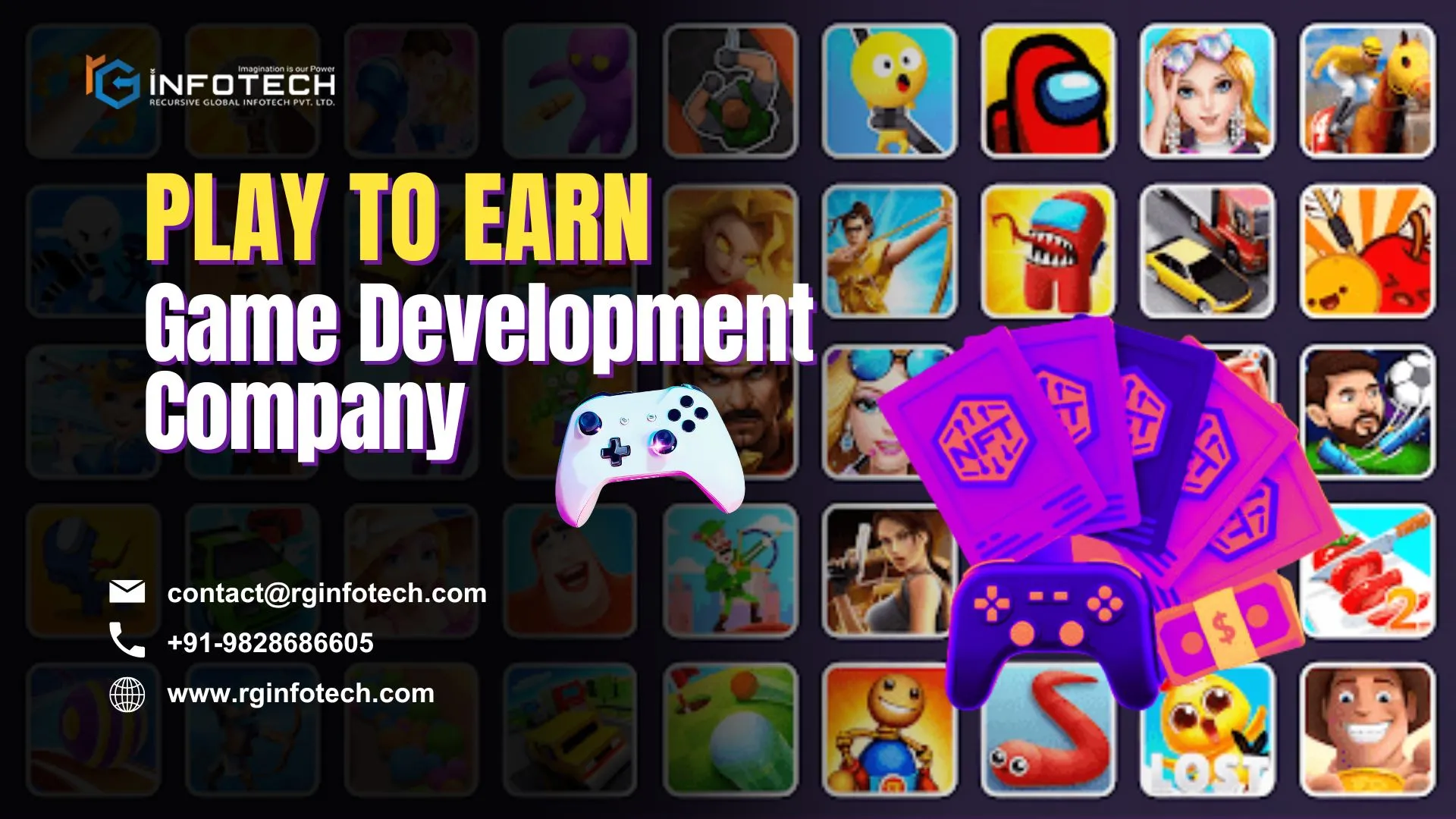Best Play to Earn Game Development Company

Research is the fundamental principle that you’ll require for investing in any business venture. Dwelling deep into the intricacies of your potential business model serves as a safeguard against disappointment and monetary setbacks. Undoubtedly, this process demands a considerable investment of time. While it may entail extensive exploration before proceeding further into the play to earn game development, the rigorous efforts and time invested in this phase help in tracking down the exact figures for cost and time. These variables often hold a significant influence when evaluating the expenses associated with mobile game app development.
Turn your Game Idea into Reality:
Get a Free Play-to-Earn Game Development Consultation Today!
What is P2E Gaming?
Play-to-earn NFT games are becoming quite popular among gamers due to their innovative and unique gaming concept. These games provide a unique opportunity for players to earn valuable rewards and assets such as NFTs and cryptocurrency while playing; these assets have some value in the real world. Players can use these assets to make in-game purchases like avatar costumes, weapons, etc. They can also sell assets for some points or other benefits.
The emergence of web3 technology is the reason behind the success of web3 p2e games; it has played a major role in revolutionizing the landscape of the gaming industry. In their true sense, play-to-earn games are blockchain-based video games where players receive reviews with both virtual and tangible worth. Unlike traditional games, these games operate in a decentralized way, free from any kind of centralized control. This decentralization empowers players to truly own their rewards and make autonomous decisions about how to use them within the game or in external markets.
How Do P2E Games Work?
Play-to-earn crypto games play a crucial role in transforming the gaming landscape by offering various rewards to players, like on-chain digital assets, which they can use for progression, trading with peers, or experience on decentralized Play to earn game development platforms. Some games even offer cryptocurrencies like Bitcoin, Ethereum, and various altcoins as rewards. An expert p2e Game developer has the flexibility to design the in-game economy as they see fit, establishing rules for asset distribution and transfer among players. Integration of non-fungible tokens (NFTs) adds an element of thrill and collectability, which enhances the game’s appeal.
It creates a more immersive environment for the players, taking their gaming experience to the next level. Blockchain-based games provide complete ownership, provable scarcity, and transparent tracking of assets, unlike traditional games where in-game assets and currencies are confined within the great environment. By making use of the immutable, decentralized, and transparent nature of blockchain technology, p2e casino and crypto games provide players with a trustless and rewarding gaming experience, offering assets with real-world value.
Unlock the Future of Gaming with Our Play to Earn Game Development Services
Play to Earn Game Development Process
Play-to-earn game development proved to be a revolutionary approach for digital gaming by seamlessly integrating blockchain technology. According to a p2e game development company, the process of developing a play-to-earn game involves several key stages:
Pre-Production
Pre-production involves various steps that are initial and crucial for a successful play-to-earn game. According to a top play to earn game development company, the first step is through research and analysis of current market trends and forming project strategies. Consequently, team formation begins with diverse talents that are crucial for the development of play-to-earn games. Meanwhile, initial conceptualization sparks creativity, shaping game mechanics and visual styles. These steps set the foundation for the game’s development journey.
Concept and Game Design
This concept and game design are pivotal parts of Play to Earn Game Development Services, where ideas evolve into tangible experiences. During concept and game design, the core gameplay mechanics, narrative elements, and visual aesthetics are thrown out. This phase involves brainstorming sessions to generate innovative concepts that align with the game’s objectives and target audience. Play-to-earn game design creates detailed documents outlining gameplay features, level designs, and character profiles.
Tokenomics and NFT Design for Play-to-Earn
Tokenomics and NFT design for p2e NFT game development are crucial components, shaping the economic structure and asset system. Tokenomics involves designing in-game tokens and determining their utility and scarcity. NFT Design focuses on crafting unique digital assets, ensuring each holds inherent value and rarity. Together, they form the backbone of the play-to-earn ecosystem, providing players with tangible rewards and fostering a vibrant virtual economy.
Blockchain Technology Selection
Selecting the right blockchain technology is crucial for the development of a play-to-earn game. It involves thorough research to assess factors like scalability, security, and smart contract capabilities. Play to earn game developers then prototype on chosen platforms to test compatibility. Based on this analysis, they make an informed decision and integrate the selected blockchain into the game’s architecture. This ensures a robust infrastructure, essential for creating a secure and rewarding gaming experience.
Production
During the production phase of Play to earn app development, teams collaborate closely to merge the technical and creative elements of the game seamlessly. Iterative development cycles facilitate ongoing refinement, ensuring that the final product aligns with the vision established during pre-production. This collaborative approach enables teams to adapt to evolving requirements, address challenges, and incorporate feedback effectively, ultimately delivering a polished and engaging play-to-earn game experience.
Game Development (Art, Animation, Programming)
Game development encompasses a multifaceted process involving various Play to earn game development tools and technologies like art, animation, and programming. Artists conceptualize and craft visually stunning elements like characters and environments, setting the tone for the game’s immersive world. Animators breathe life into these creations, infusing them with movement and personality to enhance player engagement. Meanwhile, programmers work behind the scenes, translating design concepts into functional gameplay mechanics and user interfaces.
Smart Contract Development
Smart contract development is integral to play-to-earn game creation. Developers design and code contracts to automate in-game transactions and rewards, ensuring fairness and transparency. After rigorous testing, these contracts are deployed on the blockchain network, enabling secure interactions between players and assets. This process forms the backbone of play-to-earn games, offering players a reliable Play-to-earn Game platform to earn rewards and engage with the game’s economy.
Marketplace Integration
Marketplace integration in the development of play-to-earn video games involves seamlessly incorporating blockchain-based marketplaces into the game ecosystem. Developers plan and integrate smart contracts, design user interfaces, and conduct testing before deployment. Once deployed, players can access the marketplace within the game interface, which facilitates asset trading and monetization activities. This integration enhances player engagement and contributes to the growth of the game’s virtual economy, creating a dynamic gaming experience.
Post-Production
The post-production phase of developing Play to Earn blockchain games is a critical phase where the final touches are added to ensure the game’s readiness for launch and ongoing success. This stage involves rigorous testing and quality assurance to address any remaining bugs or performance issues, ensuring a smooth and enjoyable gameplay experience. Additionally, developers strategize the game’s launch and marketing efforts to generate excitement and attract players.
Testing and quality assurance
Testing and quality assurance (QA) are crucial phases in developing Play to Earn online games to ensure a seamless gaming experience. Through rigorous testing, various functionalities are scrutinized for bugs and glitches. Quality. Assurance specialists review the game against predefined standards, ensuring it meets player expectations. Identified issues are swiftly communicated for resolution. This meticulous approach ultimately fosters player satisfaction, retention, and trust, contributing to the long-term success of a play-to-earn strategy game in a competitive gaming landscape.
Launch and Marketing Strategy
Launch and marketing strategy are pivotal in play to earn game crypto game development and are crucial for generating excitement, attracting players, and ensuring long-term success. Developers meticulously plan the launch, outlining goals, target audiences, and promotional activities. Pre-launch teasers and media outreach build anticipation, while the official release is accompanied by targeted campaigns and promotions to drive downloads and engagement. Post-launch, continuous marketing efforts, and community engagement sustain player interest and address feedback.
Ongoing Support and Maintenance
Ongoing support and maintenance from the backbone of a successful Play to Earn mobile game, ensuring its continuous operation, player satisfaction, and security. This phase involves vigilant monitoring of game performance and player feedback to swiftly identify and address any issues that may arise. Regular updates and patches are released to enhance gameplay, introduce new features, and address bugs, keeping the gaming experience fresh and engaging.
Why Choose RG Infotech for Your P2E Game Development?
Choosing RG Infotech for your p2e game development offers a distinct advantage due to our expertise, custom solutions, and commitment to quality. With seasoned developer’s skills in blockchain technology and game development, they deliver tailored solutions to meet your specific requirements and objectives. Their deep understanding of blockchain integration enables us to seamlessly incorporate decentralized mechanics into your P2E game, ensuring security and transparency. Additionally, Game Development Services should prioritize quality assurance throughout the development process, guaranteeing a polished and seamless gaming experience for players.
To Know More About The Mobile Gaming Industry, Keep Reading:
Conclusion
The above-provided details and information talk about play to earn game development. This guide covers the critical aspects required to create a successful play-to-earn game, from understanding the intricacies of blockchain integration to the potential costs involved. Whether you are a startup, SME, or enterprise, leveraging these insights can help you navigate the challenges and seize the opportunities in this innovative and rapidly growing sector. Stay tuned for more informative updates.
Frequently Asked Questions (FAQs)
Play to earn game development involves creating video games that use blockchain technology to allow players to earn real-world rewards, such as cryptocurrencies and NFTs through in-game activities and achievements.
Blockchain technology ensures decentralization, security, and transparency in play-to-earn games. It allows for true ownership of digital assets, provable scarcity, and secure transactions. Blockchain technology ensures decentralization, security, and transparency in play-to-earn games.
Costs can vary widely based on features, complexity, and team rates. A basic app for startups might range from $10,000 to $30,000. SMEs may invest between $30,000 and $120,000 for more comprehensive features. Enterprises seeking top-tier customisation could see costs exceeding $130,000.
Legal considerations include complying with gambling laws, data privacy regulations, and intellectual property rights, and ensuring all transactions meet regulatory standards. Consulting with legal experts is crucial to navigating these complexities.



 rgisales
rgisales



